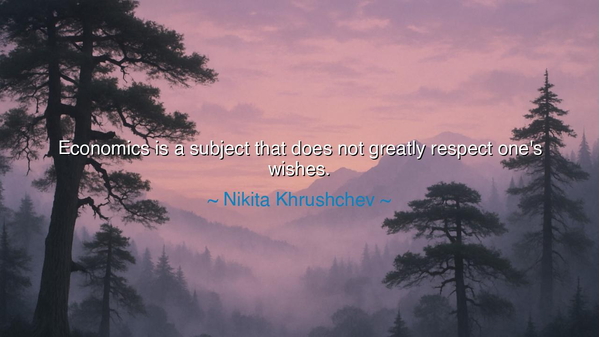
Economics is a subject that does not greatly respect one's






"Economics is a subject that does not greatly respect one's wishes," said Nikita Khrushchev, and in these words lies a profound truth about the unpredictability and hard truths of the world we live in. Economics, much like the forces of nature, is not swayed by human desires or ideals. It is a realm governed by fundamental laws and realities—the laws of supply and demand, the balance of resources, and the inevitable consequences of our collective choices. To expect economics to bend to our wishes or to conform to our ideals is to misunderstand its essence. Much like fate, it proceeds with its own rhythm, indifferent to our plans or aspirations.
In the ancient world, the Greek philosopher Heraclitus spoke of the ever-flowing nature of existence, famously stating, “You cannot step into the same river twice.” Just as the river flows relentlessly, shaped by forces beyond our control, so too does the flow of economics. It is not something that can be controlled or manipulated by mere wishes or desires. Heraclitus recognized that the world, in all its complexities, moves according to its own laws. Similarly, the realities of economics do not heed the whims of individuals or even of nations. They are governed by the deep, underlying forces of scarcity, choice, and the distribution of resources, which cannot be easily shaped by personal desire.
The Romans, with their emphasis on practicality, understood the power of economics and its indifference to human wishes. Cato the Elder, in his speeches and writings, often spoke of the importance of practical decisions based on the available resources, rather than on idealistic hopes. His admonitions to the Roman Senate focused on the imperatives of resources—agriculture, trade, and military strength—insisting that decisions about the future of Rome be grounded in reality, not in what they wished for. The economic forces at play in Roman society—whether the wealth of the empire or the needs of its citizens—dictated much of the empire's actions. To ignore them was to risk the very fabric of Roman society.
Consider the great famine in the medieval period, particularly the Great Famine of 1315-1317, when Europe was struck by widespread hunger. Despite the wishes of the people, the economic realities of crop failure, bad weather, and insufficient resources led to immense suffering. No amount of desire or prayer could change the course of these economic forces. The people of Europe, like all people throughout history, were subject to the unyielding laws of scarcity and distribution. It was not an issue of will or desire but of resources, showing that economics is a force that operates beyond human wishes.
In modern times, Khrushchev’s statement about economics rings true as well. In the Cold War era, despite the wishes of many nations, the reality of global economics shaped the geopolitical landscape. The Soviet Union, for all its might and political control, could not escape the economic constraints that ultimately led to its downfall. The USSR’s ambitious plans to compete with the West’s economic power faltered against the realities of resource management, production inefficiencies, and an unsustainable economic model. Khrushchev, as one of the leaders of the Soviet Union, was well aware of how economics had a more powerful influence than any ideological or political aspiration.
The lesson that Khrushchev’s words impart is that economics operates in a realm where wishes and hopes are often irrelevant. Just as a warrior cannot control the weather during a battle, a nation or individual cannot control the fundamental economic forces that govern resources, labor, and wealth. Understanding these forces is vital for making wise decisions. Just as philosophers and leaders of ancient times sought to understand the natural laws of the world to navigate it wisely, so too must we seek to understand the economic forces at play in our own time.
Thus, let us live with an awareness that while we may have desires for prosperity, growth, and security, it is the understanding of economic principles—the limits of resources, the inevitable consequences of our choices, and the interconnectedness of global systems—that will allow us to make informed decisions. Rather than merely wishing for things to change, we must approach the complexities of economics with clarity, realism, and a willingness to adapt to the unyielding forces at work. It is through this wisdom that we can prosper, even in a world where economics does not bend to our wishes, but follows its own immutable laws.






AAdministratorAdministrator
Welcome, honored guests. Please leave a comment, we will respond soon